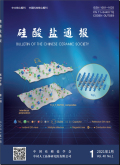硅酸盐通报2024,Vol.43Issue(4):1359-1365,7.
柔性玻璃的化学强化及其力学性能研究
Chemical Strengthening and Mechanical Properties of Flexible Glass
摘要
Abstract
Flexible glass with high bending strength is a remarkable component of flexible electronic displays.However,flexible glass is a brittle material inherently,and its mechanical properties still do not meet the requirements of application.To address this challenge,the application of chemical strengthening stands out as a viable approach to significantly bolster scratch resistance and bending strength in flexible glass.90 μm ultra-thin high-aluminum flexible glass was reinforced in the molten potassium nitrate using a conventional one-step chemical strengthening method.The effect laws of chemical strengthening temperature and time on the surface stress,Vickers hardness and bending radius of the strengthened flexible glass were investigated.The results indicate that,after ion-exchange at 380℃for 1 h,the compressive stress of sample reaches 834.12 MPa,and the depth of stress layer is 15.91 μm,at which time the glass samples have the best bending performance and scratch resistance.After chemical strengthening,the bending radiu of 90 μm flexible glass reduces from(29.8±0.73)mm to(6.94±0.99)mm.As the overly increasing exchange temperature and excessive prolongation of time,the mechanical properties of flexible glass are weakened.关键词
化学强化/柔性玻璃/表面应力/离子交换深度/弯曲半径/维氏硬度Key words
chemical strengthening/flexible glass/surface stress/ion-exchange depth/bending radiu/Vickers hardness分类
化学化工引用本文复制引用
毛婧怡,刘冰,郭振强,张家昌,袁坚..柔性玻璃的化学强化及其力学性能研究[J].硅酸盐通报,2024,43(4):1359-1365,7.基金项目
国家重点研发计划(2022YFB3603300) (2022YFB3603300)

